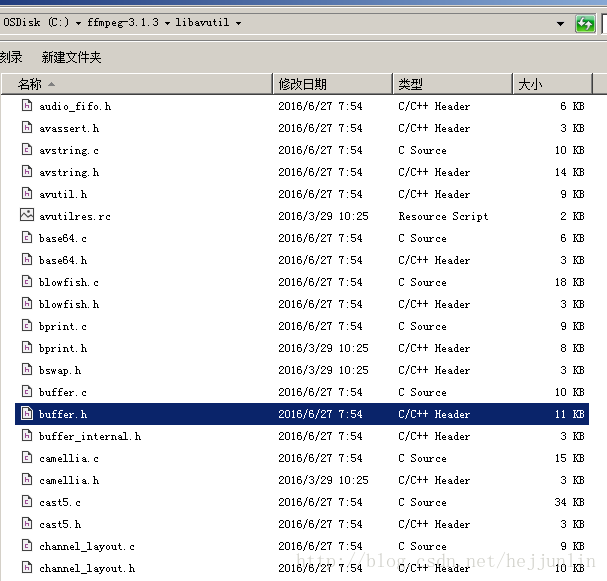位置:libavutil/buffer.h 
AVBuffer采用引用计数的数据Buffer的API。
有两个核心对象这个API——AVBuffer和AVBufferRef。
- AVBuffer代表数据缓冲区本身,它是私有的,不能直接被调用者调用。
- 我们可以通过AVBufferRef,调用者须要检查两个AVBuffer指针是否指向两个不同的引用在同一数据buffer
- AVBufferRef 代表一个单个引用指向AVBuffer,调用者可以直接调它。
有两个功能函数提供创建一个AVBuffer对象在一个单引用中,av_buffer_alloc()分配置一个新buffer空间。 av_buffer_create()负责包装已存在数组的AVBuffer对象。从一个已存在引用,其他的引用将创建通过av_buffer_ref()方法。
使用av_buffer_unref(),交释放这个引用(包含数据引用及计数引用)。
在已经存在的AVBuffer引用中,FFmpeg认为AVBuffer是可写入相关数据的。(不会被标识只读),av_buffer_is_writable() 函数提供是否可write的功能,如果不能将自动创建一个新的可写的buffer。
typedef struct AVBuffer AVBuffer;/*** A reference to a data buffer.** The size of this struct is not a part of the public ABI and it is not meant* to be allocated directly.*/typedef struct AVBufferRef {AVBuffer *buffer;/*** The data buffer. It is considered writable if and only if* this is the only reference to the buffer, in which case* av_buffer_is_writable() returns 1.*/uint8_t *data;/*** Size of data in bytes.*/int size;} AVBufferRef;/*** Allocate an AVBuffer of the given size using av_malloc().** @return an AVBufferRef of given size or NULL when out of memory*/AVBufferRef *av_buffer_alloc(int size);/*** Same as av_buffer_alloc(), except the returned buffer will be initialized* to zero.*/AVBufferRef *av_buffer_allocz(int size);/*** Always treat the buffer as read-only, even when it has only one* reference.*/#define AV_BUFFER_FLAG_READONLY (1 << 0)/*** Create an AVBuffer from an existing array.** If this function is successful, data is owned by the AVBuffer. The caller may* only access data through the returned AVBufferRef and references derived from* it.* If this function fails, data is left untouched.* @param data data array* @param size size of data in bytes* @param free a callback for freeing this buffer's data* @param opaque parameter to be got for processing or passed to free* @param flags a combination of AV_BUFFER_FLAG_*** @return an AVBufferRef referring to data on success, NULL on failure.*/AVBufferRef *av_buffer_create(uint8_t *data, int size,void (*free)(void *opaque, uint8_t *data),void *opaque, int flags);/*** Default free callback, which calls av_free() on the buffer data.* This function is meant to be passed to av_buffer_create(), not called* directly.*/void av_buffer_default_free(void *opaque, uint8_t *data);/*** Create a new reference to an AVBuffer.** @return a new AVBufferRef referring to the same AVBuffer as buf or NULL on* failure.*/AVBufferRef *av_buffer_ref(AVBufferRef *buf);/*** Free a given reference and automatically free the buffer if there are no more* references to it.** @param buf the reference to be freed. The pointer is set to NULL on return.*/void av_buffer_unref(AVBufferRef **buf);/*** @return 1 if the caller may write to the data referred to by buf (which is* true if and only if buf is the only reference to the underlying AVBuffer).* Return 0 otherwise.* A positive answer is valid until av_buffer_ref() is called on buf.*/int av_buffer_is_writable(const AVBufferRef *buf);/*** @return the opaque parameter set by av_buffer_create.*/void *av_buffer_get_opaque(const AVBufferRef *buf);int av_buffer_get_ref_count(const AVBufferRef *buf);/*** Create a writable reference from a given buffer reference, avoiding data copy* if possible.** @param buf buffer reference to make writable. On success, buf is either left* untouched, or it is unreferenced and a new writable AVBufferRef is* written in its place. On failure, buf is left untouched.* @return 0 on success, a negative AVERROR on failure.*/int av_buffer_make_writable(AVBufferRef **buf);/*** Reallocate a given buffer.** @param buf a buffer reference to reallocate. On success, buf will be* unreferenced and a new reference with the required size will be* written in its place. On failure buf will be left untouched. *buf* may be NULL, then a new buffer is allocated.* @param size required new buffer size.* @return 0 on success, a negative AVERROR on failure.** @note the buffer is actually reallocated with av_realloc() only if it was* initially allocated through av_buffer_realloc(NULL) and there is only one* reference to it (i.e. the one passed to this function). In all other cases* a new buffer is allocated and the data is copied.*/int av_buffer_realloc(AVBufferRef **buf, int size);/*** @}*/typedef struct AVBufferPool AVBufferPool;/*** Allocate and initialize a buffer pool.** @param size size of each buffer in this pool* @param alloc a function that will be used to allocate new buffers when the* pool is empty. May be NULL, then the default allocator will be used* (av_buffer_alloc()).* @return newly created buffer pool on success, NULL on error.*/AVBufferPool *av_buffer_pool_init(int size, AVBufferRef* (*alloc)(int size));/*** Allocate and initialize a buffer pool with a more complex allocator.** @param size size of each buffer in this pool* @param opaque arbitrary user data used by the allocator* @param alloc a function that will be used to allocate new buffers when the* pool is empty.* @param pool_free a function that will be called immediately before the pool* is freed. I.e. after av_buffer_pool_can_uninit() is called* by the pool and all the frames are returned to the pool and* freed. It is intended to uninitialize the user opaque data.* @return newly created buffer pool on success, NULL on error.*/AVBufferPool *av_buffer_pool_init2(int size, void *opaque,AVBufferRef* (*alloc)(void *opaque, int size),void (*pool_free)(void *opaque));/*** Mark the pool as being available for freeing. It will actually be freed only* once all the allocated buffers associated with the pool are released. Thus it* is safe to call this function while some of the allocated buffers are still* in use.** @param pool pointer to the pool to be freed. It will be set to NULL.*/void av_buffer_pool_uninit(AVBufferPool **pool);/*** Allocate a new AVBuffer, reusing an old buffer from the pool when available.* This function may be called simultaneously from multiple threads.** @return a reference to the new buffer on success, NULL on error.*/AVBufferRef *av_buffer_pool_get(AVBufferPool *pool);/*** @}*/#endif /* AVUTIL_BUFFER_H */
AVBufferPool 是用来管理大buffer时的API
调用者必须使用av_buffer_pool_init()创建一个buffer池,无论什么时候需要,通过av_buffer_pool_get(),得到新buffer的引用,和av_buffer_alloc()非常像,当不被引用时,会重新归还给pool,而不用去像AVBuffer那样释放。当调用者不再分配新的buffer时,av_buffer_pool_uninit() 必须调用,表明这个pool将自动释放了(因为这个pool也是一个对象)。分配和释放buffer,是线程安全操作,只要保证没有其他默认alloc的callback在使用。这个结构体是私有的,不能直接被外部使用,外部可以用av_buffer_pool_init(),及av_buffer_pool_uninit()函数。


